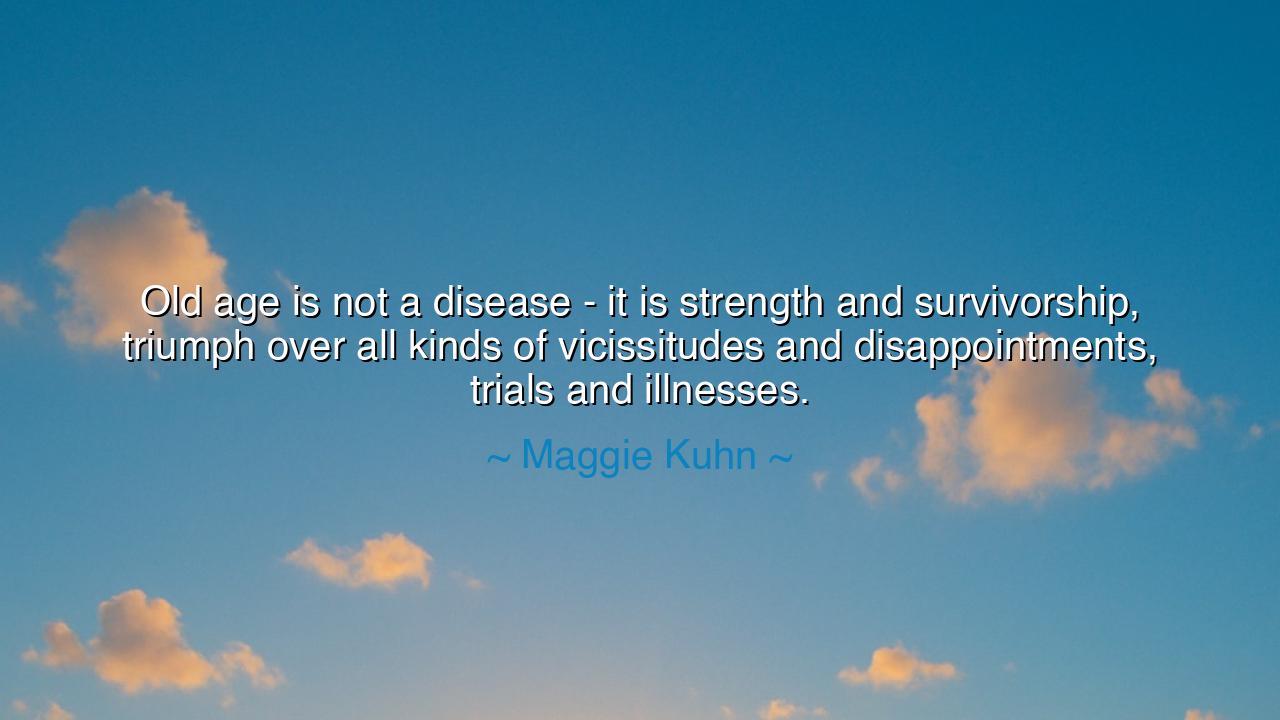
Old age is not a disease - it is strength and survivorship
Old age is not a disease - it is strength and survivorship, triumph over all kinds of vicissitudes and disappointments, trials and illnesses.






In the grand tapestry of human existence, there comes a moment when the physical body begins to show signs of wear, yet the spirit grows stronger with each passing day. Maggie Kuhn’s reflection, "Old age is not a disease - it is strength and survivorship, triumph over all kinds of vicissitudes and disappointments, trials and illnesses," speaks to the true essence of aging. To grow old is not a curse, nor is it something to fear. It is, rather, a testament to resilience, an act of triumph over the challenges that life brings. Old age, far from being a time of decline, is a celebration of the endurance of the human spirit, a victory over the many hardships one faces in a lifetime.
The ancients understood this deeply. The Greek philosophers celebrated the wisdom that comes with age, for they knew that the true value of a person is not in their physical form but in the lessons they have learned and the strength they have gained through living. Socrates, though in his later years when he was condemned to death, did not view old age as a burden but as a time of profound reflection and growth. In his final moments, Socrates was not fearful of his body’s decline, but rather focused on the eternal soul and the truths he had uncovered during his life. His life—long and full of intellectual labor—was an embodiment of Kuhn’s words: old age was not a disease but a culmination of triumph and wisdom.
Consider the story of Cicero, the great Roman orator, who in his later years faced the many trials of war, exile, and political instability. Despite these vicissitudes, Cicero continued to write, to speak, and to contribute to the philosophical and political life of Rome. His old age was marked not by defeat, but by a strength of character, by a desire to pass on the wisdom he had gained over a lifetime. He understood that old age is not about diminishing, but about growing stronger through experience and adversity. His words and deeds in his later years serve as a powerful reminder that to grow old is to have lived through many battles—some fought in the body, others in the mind and soul—and still to stand tall, unbroken.
In our own time, Maggie Kuhn was a shining example of what it means to turn old age into a force for good. Known for founding the Gray Panthers in her later years, Kuhn dedicated her life to advocating for the rights of the elderly and to challenging the stereotypes and marginalization that often accompany old age. Kuhn’s work is a modern-day embodiment of her own words—she saw old age not as a time for retirement, but as a time for action, for using the wisdom gained over a lifetime to make the world a better place for all. Her activism became a powerful statement of survivorship, a testament to strength in the face of the many trials life can throw at us.
Old age, as Kuhn rightly points out, is a triumph. It is a victory over time itself, over sickness, over loss, over the many challenges life has thrown in our path. To grow old is not to be diminished but to become, in a sense, more fully human, more aware of the deeper truths of existence. The wisdom of the elderly is not merely the sum of their knowledge, but the strength they have cultivated in enduring the challenges of a long life. The hardships they have faced—be it in battle, in health, or in personal trials—have forged them into beings of deep resilience, and it is through their stories and examples that the younger generations find strength.
The lesson we take from Maggie Kuhn’s words is this: we must celebrate old age as a time of wisdom, resilience, and strength. Rather than fear the inevitable decline of the body, we must embrace the beauty of growing old as a triumph of spirit, a victory over the challenges life has brought our way. The elderly should not be seen as fragile or weakened, but as individuals who have stood through the storm and come out stronger for it. Their stories and their wisdom are the treasures of humanity, and it is through honoring their experiences that we too find the courage to face our own challenges with grace and dignity.
Practical action, then, calls upon us to value and respect the elderly, to recognize the wealth of experience they carry with them. Let us not dismiss their voices, but listen to them, learn from them, and honor them for the strength they have shown. We must also ensure that the elderly are given the opportunity to continue contributing to society, to pass on their wisdom, and to live with dignity and purpose in their later years. Just as the ancients celebrated old age as a time of wisdom and growth, so too must we. Old age is not a time to be feared but a time to be honored—for in it lies the triumph of the human spirit over the trials of life.






AAdministratorAdministrator
Welcome, honored guests. Please leave a comment, we will respond soon